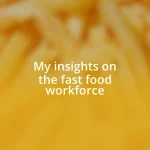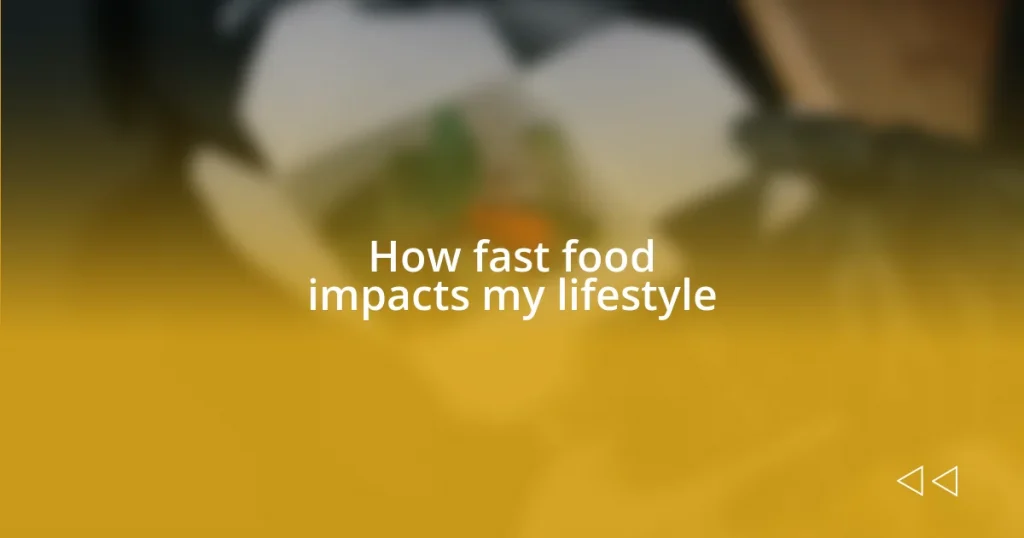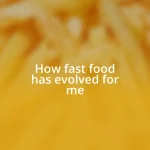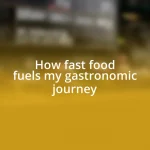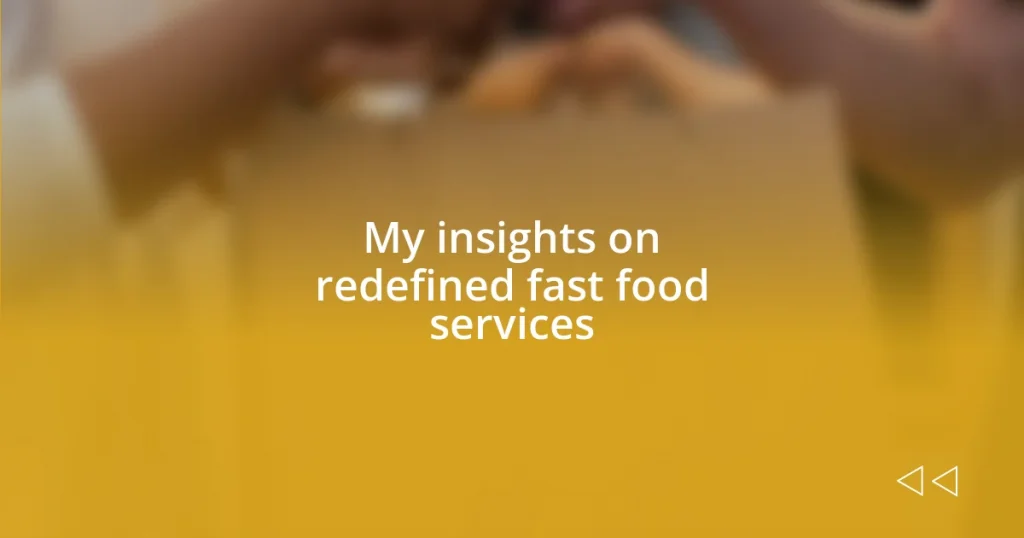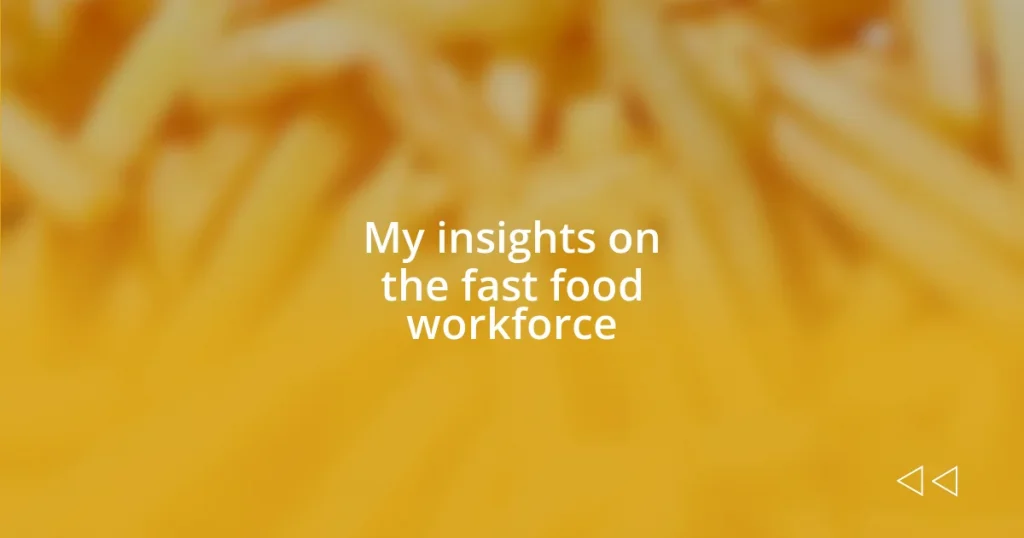Key takeaways:
- Fast food culture impacts daily routines, social interactions, and emotional well-being, often providing both convenience and moments of connection.
- While fast food can embody unhealthy choices leading to weight gain, mood swings, and nutrient deficiencies, healthier options are available and can positively influence energy levels and overall health.
- Making mindful choices, such as customizing orders and planning meals, allows individuals to enjoy fast food without compromising nutrition and emotional satisfaction.

Understanding fast food culture
Fast food culture is more than just convenience; it often shapes our daily routines and social interactions. I remember my college days, where late-night study sessions frequently ended with a drive-thru run. It was more than food; it was a moment of camaraderie with friends, sharing laughter over greasy fries, and indulging in late-night cravings. Can you relate to those spontaneous outings that turned into treasured memories?
The allure of fast food lies in its ability to cater to our busy lives. Often, I find myself reaching for a quick meal because time feels like a luxury I can’t afford. It’s a common scenario; you rush from work to home, and a familiar golden arches sign brightens your path. But have you ever stopped to consider how these convenient choices affect not just your diet but also your overall lifestyle?
Moreover, fast food has infiltrated our social norms to a surprising degree. I’ve noticed how gatherings and celebrations often revolve around ordering pizza or burgers, reflecting both convenience and a sense of belonging. It makes me wonder—are we becoming so accustomed to these easy options that we’ve lost touch with more meaningful meals that tell a story?
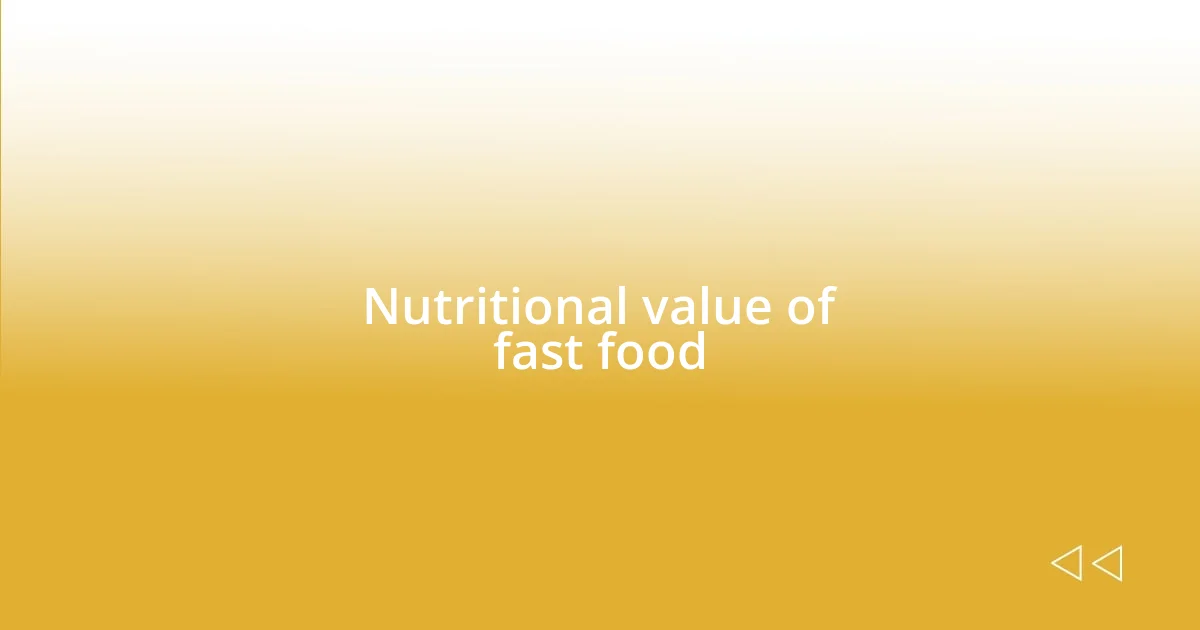
Nutritional value of fast food
The nutritional value of fast food often raises eyebrows. I’ve seen firsthand how a quick burger or fries can pack in a hefty dose of calories while lacking essential nutrients. It’s concerning to think that what seems like a harmless indulgence can sneak in excessive amounts of sodium and unhealthy fats—something I learned the hard way during a busy work week when I relied too much on fast food for sustenance.
In contrast, not all fast food is created equal. Having navigated the menus of various chains, I’ve discovered some places offer healthier options, including salads and grilled proteins. Choosing these alternatives can really make a difference; I felt a notable boost in my energy levels even after a hectic day. Have you ever experienced the difference between a greasy meal and something healthier, like a grilled chicken salad, especially when you’re trying to stay alert?
To further illustrate the nutritional differences, I’ve created a simple comparison of typical fast food options:
| Food Item | Calories | Fat (g) | Sodium (mg) |
|---|---|---|---|
| Cheeseburger | 300 | 12 | 800 |
| Grilled Chicken Salad | 200 | 7 | 600 |
| French Fries (Medium) | 320 | 15 | 350 |
| Chicken Wrap | 400 | 18 | 750 |
This table serves as a helpful reminder that while fast food can offer convenience, it’s essential to remain informed about what we’re consuming. It has truly shifted my perspective on my choices, encouraging me to seek better options even in moments of convenience.

Health effects of fast food
The health effects of fast food can be quite profound and alarming. Personally, I’ve noticed how those late-night cheesy fries affect my energy levels the next day. I vividly recall a time I indulged in a burger after a long shift; instead of feeling satisfied, I faced a wave of lethargy that made me question whether that quick fix was worth it. It’s strange how something that seems so gratifying at the moment can leave you feeling sluggish and unmotivated.
To give a clearer picture, here are some common health effects I’ve observed over time:
- Weight Gain: The high caloric content can lead to unwanted weight accumulation.
- Increased Blood Pressure: Excessive sodium levels are known to spike blood pressure, a factor I’ve been conscious of since my family has a history of hypertension.
- Digestive Issues: Fast food often lacks fiber, leading to digestive discomfort, something I’ve experienced after a heavy meal.
- Mood Swings: I’ve felt the connection between diet and mood—a greasy meal can sometimes put me in a low mood instead of lifting my spirits as intended.
- Nutrient Deficiency: Over-reliance on fast food often means missing out on vital nutrients, a reality that’s struck me when I began feeling fatigued and unwell.
The more I’ve dug into these impacts, the more I realize how my lifestyle choices can domino into larger health concerns. It’s enlightening to think about how one meal can influence your day—or even your life.

Emotional impact of fast food
Eating fast food doesn’t just fill our stomachs; it leaves an emotional mark that can linger. I remember a time when I turned to a quick meal after a particularly stressful day. The momentary satisfaction of indulging in a buttery sandwich quickly faded, leaving me wondering why I felt a wave of guilt and disappointment. Isn’t it odd how something that should offer comfort can lead to such conflicting emotions?
There’s also this undeniable connection between our food choices and how we perceive ourselves. On days I choose greasy options, I often notice a dip in my self-esteem. It’s almost as if my body is sending me a message—like my cravings overshadow my nutritional needs. While biting into that crispy fried chicken may feel like a treat momentarily, have you ever felt that aftertaste of regret creeping in?
Over time, I realized that these emotional ups and downs tied to fast food can affect my overall mental well-being. I’ve had nights where I sought solace in a large pizza, thinking it would cheer me up, only to feel groggy and defeated afterward. The contrast between fleeting joy and lasting lethargy is staggering. Do you ever find yourself caught in that cycle? Meeting that emotional void with food instead of healthier activities can become a slippery slope, making it even more challenging to break the pattern.

Social aspects of fast food
Fast food often serves as a backdrop for social interactions, shaping our experiences and memories with friends and family. I remember a gathering with friends at a fast food joint; the laughter, shared fries, and friendly banter created an atmosphere of comfort that I cherish. Yet, it’s fascinating how these moments can blur the lines between convenience and meaningful connection; do we bond over food because it’s available or because we genuinely enjoy the shared experience?
There’s an interesting dynamic at play when it comes to fast food culture in social settings. I’ve noticed that grabbing a quick meal can simplify decision-making, especially when time is tight. However, I often wonder if we rely too heavily on these establishments to fuel our social lives. Can a table full of burgers truly compare to a home-cooked meal shared among loved ones? The convenience is tempting, but what do we lose by opting for the easy route?
On the flip side, fast food also acts as a social equalizer. I remember a time when a friend and I were both struggling financially. Meeting over a cup of coffee at a fast food restaurant felt less burdensome than an expensive café. It reminded me that sometimes, the simplest meals can bring us together, fostering camaraderie amidst our everyday challenges. Isn’t it intriguing how a drive-thru meal can create bonds, yet also draw questions about our choices and lifestyles?

Incorporating fast food wisely
Incorporating fast food wisely means recognizing its place in my life without letting it take control. I’ve made it a point to indulge occasionally, but with a balanced mindset. For instance, I’m all about enjoying a burger on a hectic Friday night, yet I actively pair it with a small side salad to add some nutritional value. It may sound simple, but that small choice helps me feel more empowered about my selections.
To navigate the fast food landscape, I’ve learned to look for healthier options on menus. Recently, I discovered a place with a grilled chicken sandwich made fresh, and it surprisingly filled me up without that heavy feeling afterward. I often ask myself, how can I turn fast food into a more nourishing experience? It’s about being attentive to the choices available, rather than blindly opting for the usual fries and soda combo.
Moreover, planning fast food meals can be a game-changer. I keep a mental note of my cravings and prepare for busy days by allowing for a fast food stop when I know I’ll need it. Using fast food wisely means I’m in control, rather than letting it control my schedule. In doing so, I avoid the last-minute rush for a drive-thru, and that foresight significantly reduces the chance of regret. Have you ever found that a little planning can lead to a more satisfying fast food experience? I certainly have!

Making healthier fast food choices
When it comes to making healthier fast food choices, I often find myself evaluating the menu before even stepping in. Just the other day, I was at a popular chain and noticed a section dedicated to “lighter options.” Choosing a grilled chicken wrap instead of a fried burger might seem like a small change, but I could feel that decision reverberate positively throughout my day. It’s fascinating how these seemingly minor adjustments can lead to not just better nutrition, but also an improved mood.
I also like to customize my orders to make them healthier. For instance, when I order a burger, I often ask for no mayonnaise and extra veggies instead. This simple swap not only cuts down on extra calories but also adds some crunch and flavor. Have you ever tried adjusting your fast food orders? The boldness of asking for modifications initially felt daunting, but I’ve learned that taking charge of my meal is empowering. It’s like a little act of self-care amidst a sea of hurried choices!
Sometimes, I think about the role of sides in my fast food experience. Instead of fries, I’ve started opting for fruit cups or side salads. On a recent outing, I ordered a wrap and paired it with a refreshing apple slices pack. It felt great to nourish myself creatively while enjoying that fast food convenience. You’d be surprised how we can still savor those delicious flavors while consciously leaning toward better choices. Isn’t it inspiring how we can reshape our fast food habits with just a little thought?


